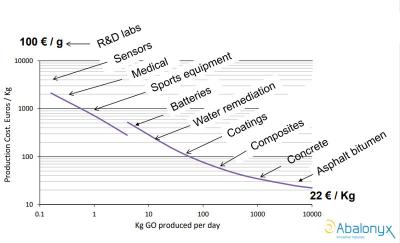The Graphene-Info newsletter, October 2018
Published: Tue, 10/02/18
The Graphene Flagship moves towards new stage
The Graphene Flagship was launched in 2013 with the mission to take graphene and related layered materials from academic laboratories to the market, revolutionize multiple industries and create economic growth and new jobs in Europe. Five years later, the Flagship consortium has reported that it successfully completed the Core1 phase and is progressing towards more applied phases. It is reportedly on its way to achieving its objective of developing the high potential of graphene and related 2D materials to the point of having a dramatic impact on multiple industries.
The Reviewing Panel thoroughly examined the results obtained in this Core1 phase and concluded that for many topics, there has been a clear transformation of the activities, moving from individual research projects to genuine collaboration towards larger goals – exactly what a Flagship project should aim for. Nearly all milestones and key performance indicators have been met, often exceeding expectations. The shift towards the Core2 phase will see the addition of a number of so-called Spearhead projects. Another development being ushered in with Core2 is the launch of the Network of Business Developers. The business developers will be the key players in creating the network connecting the research efforts to industry.
BAC receives funding to bring its graphene-enhanced supercar to market
In 2016, Briggs Automotive Company (BAC) developed a vehicle made with graphene in its bodywork. Now, BAC received funding to undertake graphene research, with a view to pushing the technology towards production-readiness for the automotive industry.
The road-legal, single-seater supercar – the BAC Mono – received the Niche Vehicle Network (NVN) grant alongside Haydale Composite Solutions and Pentaxia Composites and will further explore the benefits of using graphene in composite body panels. The NVN funding will enable BAC, Haydale and Pentaxia to develop lightweight composite materials using graphene and manufacture a novel carbon fibre composite tooling system with enhanced thermal conductivity.
Directa Plus unveils world's first road surface containing graphene
Directa Plus announced the world’s first road resurfaced with a super-modifier containing the company’s graphene. Directa said the road surface is on a section of Rome’s Strada Provinciale Ardeatina. It is part of a commercial test of Ecopave, which is based on Directa’s Graphene Plus graphene product.
Directa has developed Ecopave with Iterchimica, an Italian-based maker of products that enhance asphalt performance and the laying of road surfaces in order to increase safety, environmental sustainability, and efficiency. Ecopave, which was developed through three years of research, improves the surface's physical and mechanical performance by increasing resilience to deformation and by decreasing sensitivity to variations in ambient temperature.
Haydale and WCPC to develop graphene-enhanced wearable technology for the 2020 Olympic Games
Initial work is already in progress to incorporate Haydale’s advanced materials into flexible, printable coatings which will be embedded into a range of apparel for elite athletes. Initial deliverables include prototype wearable technology garments which demonstrate the form, technical functionality and wearability aspects required by elite athletes. Production is expected for garments for use by athletes during their training and in competitions up to 2020.
Abalonyx sees GO production cost reaching 22 Euro/Kg at high volumes
Norway-based Graphene Oxide developer Abalonyx says that there is a strong interest in graphene oxide (GO) solutions in the research community, across a wide range of applications. While first industrial adoption is "on the horizon", Abalonyx estimates that industry acceptance is strongly related to cost.
Abalonyx' current production cost is around €800 per Kg (dry weight basis) - since the Company's GO is currently used by researchers and early R&D efforts. Abalonyx estimates that as production volume goes up, the price of production could reach around 22 Euro / Kg - which will make GO applicable for areas such as concrete and asphalt.
Graphene-Info interviews Graphmatech's CFO, Björn Lindh
Sweden-based Graphmatech develops and produces novel graphene-based nanocomposite materials, under the Aros Graphene brand. The company recently secured an investment from ABB and Walerud Ventures, and the company's CFO, Björn Lindh, was kind enough to answer a few questions we had to him.
Skeleton enters agreement with Wrights Group to install graphene-based supercapacitors on buses
Skeleton Technologies and British bus manufacturer Wrights Group have announced the signing of a high-volume, multi-million-euro contract for the next 5 years. Skeleton Technologies will supply graphene-based supercapacitors to the latest KERS enabled hybrid-electric double and single deck buses produced by the Wrights Group.
The integration of graphene-based supercapacitors into test WrightBus double deck buses reportedly enables a 36% fuel saving compared to a UK-based EuroVI diesel bus baseline. It also adds at least another 3 passengers to the capacity of these buses compared to a lithium battery-based hybrid equivalent.
Researchers at the University of Bristol are developing graphene-enabled ‘smart trousers’ with artificial ‘muscles’ which could help the elderly and disabled with their mobility.
Advanced materials group Versarien has acquired 62% of Spain-based Gnanomat for around £2.6 million (around $3.4 million USD).
Clean TeQ and Ionic Industries have formed a Joint Venture to progress the commercialization of graphene-based water treatment technologies.
A new study by KGI, UC Berkeley and Nanomedical Diagnostics researchers illustrates the impact of a graphene-based biosensors in identifying the circulating biomarkers of aging.
In a new study at the University of Illinois at Urbana-Champaign, researchers used an ancient coating process called gilding and added a twist - adding a layer of graphene on top of palladium metal leaves resulted in doubling the protective quality of gilding against wear and tear.
Graphmatech, a Swedish materials technology startup that develops and sells novel graphene-based nanocomposite materials and services, closed a seed investment round led by ABB Technology Ventures (ATV), the venture capital arm of ABB, and Stockholm-based Walerud Ventures.
BSI, the UK-based standards body and global certification company, published a new guide to the properties of graphene flakes, PAS 1201.
Researchers from Virginia Tech and Lawrence Livermore National Laboratory developed a new way to 3D print with graphene.
Liquid X Printed Metals, an advanced material manufacturer of functional metallic inks, announced a collaboration effort with Bonbouton (a company focused on developing thermal sensing applications using a smart textile platform) to build graphene-enhanced temperature and pressure sensors directly on textiles using additive manufacturing techniques.
Graphenea, in collaboration with industrial and academic partners (Infineon Technologies, WITec, RWTH Aachen University and Simune Atomistics), announced the successful completion of project NanoGraM that focused on nano/microelectromechanical (NEMS/MEMS) devices based on graphene.
In January 2017 the world's lightest mechanical chronograph watch was unveiled in Geneva, Switzerland, made with an innovative graphene-enhanced composite material. Now, the research behind the project has been published.
Graphite India's wholly owned subsidiary in the Netherlands, Graphite International BV, signed an agreement for investment of up to US $18.595 million in multiple tranches in cash in General Graphene Corporation which would constitute approximately 46% stake in the Company.
Do you have a friend or a colleague that might be interested in Graphene technology? Forward this mail to update him on the world of Graphene.
If you received this email from a friend, subscribe to this newsletter here!







